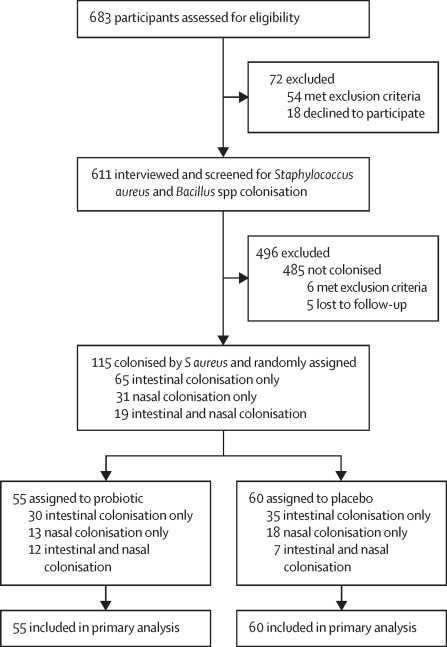💡 The study aimed to evaluate the efficacy of the probiotic 𝘉𝘢𝘤𝘪𝘭𝘭𝘶𝘴 𝘴𝘶𝘣𝘵𝘪𝘭𝘪𝘴 (𝘉. 𝘴𝘶𝘣𝘵𝘪𝘭𝘪𝘴) in reducing 𝘚𝘵𝘢𝘱𝘩𝘺𝘭𝘰𝘤𝘰𝘤𝘤𝘶𝘴 𝘢𝘶𝘳𝘦𝘶𝘴 (𝘚. 𝘢𝘶𝘳𝘦𝘶𝘴) colonization in human intestines and nares, addressing the limitations of previous decolonization strategies.
📍 Methods:
📌 Trial Design: Single-center, phase 2, double-blind, randomized, placebo-controlled trial.
📌 Participants: Adults from Songkhla, Thailand, colonized by 𝘚𝘵𝘢𝘱𝘩𝘺𝘭𝘰𝘤𝘰𝘤𝘤𝘶𝘴 𝘢𝘶𝘳𝘦𝘶𝘴, without recent antibiotic treatment or intestinal diseases.
📌 Intervention: Participants received 250 mg of 𝘉𝘢𝘤𝘪𝘭𝘭𝘶𝘴 𝘴𝘶𝘣𝘵𝘪𝘭𝘪𝘴 MB40 or placebo daily for 30 days.
📌 Outcome Measures: Primary outcome was 𝘚𝘵𝘢𝘱𝘩𝘺𝘭𝘰𝘤𝘰𝘤𝘤𝘶𝘴 𝘢𝘶𝘳𝘦𝘶𝘴 colonization reduction in the intestine (faecal counts) and nares (nasal swabs).
📍 Key Scientific Findings:
📌 Probiotic Efficacy: 𝘉𝘢𝘤𝘪𝘭𝘭𝘶𝘴 𝘴𝘶𝘣𝘵𝘪𝘭𝘪𝘴 probiotic led to a significant reduction of 𝘚𝘵𝘢𝘱𝘩𝘺𝘭𝘰𝘤𝘰𝘤𝘤𝘶𝘴 𝘢𝘶𝘳𝘦𝘶𝘴 in stool (96.8%) and nose (65.4%).
The intervention targeted intestinal 𝘚𝘵𝘢𝘱𝘩𝘺𝘭𝘰𝘤𝘰𝘤𝘤𝘶𝘴 𝘢𝘶𝘳𝘦𝘶𝘴 colonization, showcasing a novel approach compared to traditional nose and skin-focused strategies.
📌 Safety and Microbiome Impact: No severe adverse effects were reported, and overall microbiome composition remained unaffected.
The probiotic strategy demonstrated safety and efficacy without causing harm to the existing microbiota.
📌 Quantitative Analysis: Colonization densities in the intestine were reduced by an average factor of approximately 31, highlighting the potency of the probiotic.
The study used quantitative data, distinguishing it from previous qualitative approaches.
📌 Long-Term Applicability: Prolonged intake of 𝘉𝘢𝘤𝘪𝘭𝘭𝘶𝘴 𝘴𝘶𝘣𝘵𝘪𝘭𝘪𝘴 could potentially yield more pronounced effects, considering the transient nature of Bacillus colonization.
The probiotic strategy allows for long-term application without harmful side effects, a notable advantage over short-term antibiotic procedures.
📌 Intestinal Dominance in Colonization: The study emphasized the overwhelming importance of the intestinal colonisation site for overall 𝘚𝘵𝘢𝘱𝘩𝘺𝘭𝘰𝘤𝘰𝘤𝘤𝘶𝘴 𝘢𝘶𝘳𝘦𝘶𝘴 colonisation, based on quantitative data.
Reduction of nasal colonization suggested a dominating role of the intestinal site in 𝘚𝘵𝘢𝘱𝘩𝘺𝘭𝘰𝘤𝘰𝘤𝘤𝘶𝘴 𝘢𝘶𝘳𝘦𝘶𝘴 dynamics.
📌 Implications for Future Strategies: 𝘉𝘢𝘤𝘪𝘭𝘭𝘶𝘴 𝘴𝘶𝘣𝘵𝘪𝘭𝘪𝘴 probiotic offers a previously unavailable method for eradicating the main intestinal reservoir of 𝘚𝘵𝘢𝘱𝘩𝘺𝘭𝘰𝘤𝘰𝘤𝘤𝘶𝘴 𝘢𝘶𝘳𝘦𝘶𝘴.
The findings support a shift towards intestinal-focused decolonization efforts, challenging conventional strategies targeting the nose and skin.
📍 The study establishes the efficacy and safety of the 𝘉𝘢𝘤𝘪𝘭𝘭𝘶𝘴 𝘴𝘶𝘣𝘵𝘪𝘭𝘪𝘴 probiotic in reducing 𝘚𝘵𝘢𝘱𝘩𝘺𝘭𝘰𝘤𝘰𝘤𝘤𝘶𝘴 𝘢𝘶𝘳𝘦𝘶𝘴 colonization, presenting a promising alternative for individuals at risk of recurring 𝘚𝘵𝘢𝘱𝘩𝘺𝘭𝘰𝘤𝘰𝘤𝘤𝘶𝘴 𝘢𝘶𝘳𝘦𝘶𝘴 infections. The focus on intestinal colonization dynamics calls for a reevaluation of decolonization strategies, emphasizing the potential of probiotics in long-term applications without adverse effects on the microbiota.
Link to the article : http://tinyurl.com/4935fxpt
